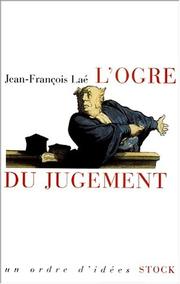| Listing 1 - 10 of 27 | << page >> |
Sort by
|
Book
Year: 1911 Publisher: London : Luzac,
Abstract | Keywords | Export | Availability | Bookmark
 Loading...
Loading...Choose an application
- Reference Manager
- EndNote
- RefWorks (Direct export to RefWorks)
Islamic law --- Islamic law - social aspects. --- History. --- Social aspects.

ISBN: 9782234054226 2234054222 Year: 2001 Publisher: Paris: Stock,
Abstract | Keywords | Export | Availability | Bookmark
 Loading...
Loading...Choose an application
- Reference Manager
- EndNote
- RefWorks (Direct export to RefWorks)
Judgments - France - History. --- Law - Social aspects - France. --- Justice - History of Law --- Judgments --- Law

ISBN: 2091904333 9782091904337 Year: 1996 Publisher: Paris: Fernand Nathan,
Abstract | Keywords | Export | Availability | Bookmark
 Loading...
Loading...Choose an application
- Reference Manager
- EndNote
- RefWorks (Direct export to RefWorks)
Ethnological jurisprudence --- Sociological jurisprudence --- Ethnologie juridique --- Sociologie juridique --- Droit --- Law --- Aspect social --- Social aspects --- Anthropologie juridique --- Anthropologie juridique. --- Sociologie juridique. --- Aspect social. --- Droit - Aspect social --- Law - Social aspects
Book
ISBN: 9780521687119 9780521867511 052168711X 0521867517 9780511780813 1107210267 0511852452 9786612908200 0511931263 0511932618 0511929935 0511924887 0511780818 1282908200 0511927428 9780511929939 9780511932618 9780511927423 9781107210264 9780511852459 9781282908208 6612908203 9780511931260 9780511924880 Year: 2010 Publisher: New York: Cambridge university press,
Abstract | Keywords | Export | Availability | Bookmark
 Loading...
Loading...Choose an application
- Reference Manager
- EndNote
- RefWorks (Direct export to RefWorks)
"In this book, Andrew Riggsby offers a survey of the main areas of Roman law, both substantive and procedural, and how the legal world interacted with the rest of Roman life. Emphasising basic concepts, he recounts its historical development and focuses in particular on the later Republic and early centuries of the Roman Empire. The volume is designed as an introductory work, with brief chapters that will be accessible to college students with little knowledge of legal matters or Roman antiquity. The text is also free of technical language and Latin terminology. It can be used in courses on Roman law, Roman history, or comparative law, but it will also serve as a useful reference for more advanced students and scholars"--
Roman law --- Droit romain --- Social aspects --- Aspect social --- Social aspects. --- Civil law --- Civil law (Roman law) --- Law --- Law, Roman --- Arts and Humanities --- History --- Roman law - Social aspects --- Civil law.
Book
ISSN: 12961698 21013128 ISBN: 9782213666549 2213666547 Year: 2016 Publisher: Paris: Arthème Fayard,
Abstract | Keywords | Export | Availability | Bookmark
 Loading...
Loading...Choose an application
- Reference Manager
- EndNote
- RefWorks (Direct export to RefWorks)
Pendant plusieurs années, Geoffroy de Lagasnerie s'est rendu à la cour d'assises de Paris. Il a vu être jugés et condamnés des individus accusés de braquage, d'attentat, d'assassinat, de coups mortels, de viol. À partir de cette expérience, il propose une réflexion sur l'État pénal, le pouvoir et la violence. Nos manières de rendre la Justice s'inscrivent dans un système général et a priori paradoxal : pour juger, les procès construisent une narration individualisante des acteurs et des causes de leurs actes ; mais, pour réprimer, ils transforment chaque action interindividuelle en agression contre la « société » ou contre l'« État ». Comment comprendre ce système du jugement et de la répression et ce jeu des catégories pénales ? La Loi est souvent présentée comme instaurant le règne de la raison contre les réactions passionnelles. Ne produit-elle pas en réalité des effets de dépossession et du traumatisme ? À quelles conditions une sociologie critique pourrait-elle nous donner les moyens d'imaginer un droit moins violent, un État moins souverain et une justice plus démocratique ? En mêlant récits et analyses théoriques, Geoffroy de Lagasnerie montre que l'institution judiciaire ne forme pas seulement une réponse à la délinquance. La scène du tribunal, où un individu est forcé de comparaître devant des juges, est un miroir grossissant de notre appartenance à l'État. Si bien que, au bout du compte, cet ouvrage offre une exploration de notre condition de sujet politique
Sociologie juridique. --- Droit pénal. --- Droit --- Philosophie. --- Sociological jurisprudence --- Law --- Social aspects --- Justice pénale --- Violence institutionnelle --- Administration --- Sociologie --- Criminal law --- Sociologie juridique --- Droit pénal --- Philosophy --- Philosophie --- Droit pénal --- Law - Social aspects --- Justice pénale
Book
ISBN: 9780226426037 0226426033 9780226005812 022600581X Year: 2011 Publisher: Chicago: University of Chicago press,
Abstract | Keywords | Export | Availability | Bookmark
 Loading...
Loading...Choose an application
- Reference Manager
- EndNote
- RefWorks (Direct export to RefWorks)
Conundrums, puzzles, and perversities: these are Leo Katz’s stock-in-trade, and in Why the Law Is So Perverse, he focuses on four fundamental features of our legal system, all of which seem to not make sense on some level and to demand explanation. First, legal decisions are essentially made in an either/or fashion—guilty or not guilty, liable or not liable, either it’s a contract or it’s not—but reality is rarely as clear-cut. Why aren’t there any in-between verdicts? Second, the law is full of loopholes. No one seems to like them, but somehow they cannot be made to disappear. Why? Third, legal systems are loath to punish certain kinds of highly immoral conduct while prosecuting other far less pernicious behaviors. What makes a villainy a felony? Finally, why does the law often prohibit what are sometimes called win-win transactions, such as organ sales or surrogacy contracts?Katz asserts that these perversions arise out of a cluster of logical difficulties related to multicriterial decision making. The discovery of these difficulties dates back to Condorcet’s eighteenth-century exploration of voting rules, which marked the beginning of what we know today as social choice theory. Condorcet’s voting cycles, Arrow’s Theorem, Sen’s Libertarian Paradox—every seeming perversity of the law turns out to be the counterpart of one of the many voting paradoxes that lie at the heart of social choice. Katz’s lucid explanations and apt examples show why they resist any easy resolutions.
Law --- Law and ethics. --- Droit --- Droit et morale --- Interpretation and construction. --- Social aspects. --- Interprétation --- Aspect social --- Law and ethics --- Interpretation and construction --- Social aspects --- Interprétation --- Law - Interpretation and construction --- Law - Social aspects
Book
ISBN: 9780415792219 0415792215 1351683748 1351683756 1315167697 Year: 2019 Publisher: Abingdon: Routledge,
Abstract | Keywords | Export | Availability | Bookmark
 Loading...
Loading...Choose an application
- Reference Manager
- EndNote
- RefWorks (Direct export to RefWorks)
"Research on law's relationship with time has flourished over the past decade. This edited collection aims to put law and time scholarship into wider context, advancing conversations on time and temporalities between socio-legal scholars, anthropologists, sociologists, geographers and historians. Through a diverse range of contributions, the collection explores how legal modalities of time emerge and have effects within wider clusters of social and political action. Themes include: law's diverse roles in maintaining linear historicist models of time; law's participation in the materialisation of times; and the unsteady effects of temporal pluralism and polytemporalities in law. De-naturalising the 'time' in law and time scholarship, this collection positions time as something that can be enacted and materialised as well as experienced, with distinct implications for questions of social justice."
Time (Law) --- Social aspects --- Social aspects. --- Civil procedure --- Notice (Law) --- Limitation of actions --- Time (Law) - Social aspects --- alternative medicine --- traditional medicine --- law --- medicine --- Ayurveda --- Biomedicine --- Europe --- Health care --- Modernity --- Public health --- Temporalities
Book
ISBN: 0803953429 0803953410 9780803953420 Year: 1994 Volume: 7 Publisher: Thousand Oaks (Calif.): Sage,
Abstract | Keywords | Export | Availability | Bookmark
 Loading...
Loading...Choose an application
- Reference Manager
- EndNote
- RefWorks (Direct export to RefWorks)
Criminal justice, Administration of --- Law --- Violence --- Violent crimes --- Justice pénale --- Droit --- Crimes violents --- Social aspects --- Administration --- Aspect social --- 343.969 <73> --- Geweld in het algemeen--Verenigde Staten van Amerika. VSA. USA --- 343.969 <73> Geweld in het algemeen--Verenigde Staten van Amerika. VSA. USA --- Justice pénale --- Crimes, Violent --- Crimes of violence --- Crime --- Violent behavior --- Social psychology --- Acts, Legislative --- Enactments, Legislative --- Laws (Statutes) --- Legislative acts --- Legislative enactments --- Jurisprudence --- Legislation --- United States --- Criminal justice [Administration of ] --- Law - Social aspects - United States. --- Violent crimes - United States - Congresses. --- Violence - United States - Congresses. --- Law - Social aspects - United States - Congresses. --- Criminal justice, Administration of - United States - Congresses.
Book
ISBN: 9780521144063 9780521194877 052114406X 0521194873 Year: 2013 Publisher: Cambridge: Cambridge university press,
Abstract | Keywords | Export | Availability | Bookmark
 Loading...
Loading...Choose an application
- Reference Manager
- EndNote
- RefWorks (Direct export to RefWorks)
[2nd ed.] "Written by one of the world's leading international lawyers, this is the new and updated edition of Jan Klabber's landmark textbook. International law can be defined as 'the rules governing the legal relationship between nations and states', but in reality it is much more complex, with political, diplomatic and socio-economic factors shaping the law and its application. This refreshingly clear, concise textbook encourages students to view international law as a dynamic system of organizing the world. Bringing international law back to its first principles, the book is organised around four questions: where does it come from? To whom does it apply? How does it resolve conflict? And what does it say? Building on these questions with both academic rigour and clarity of expression, Professor Klabbers breathes life and energy into the subject. Footnotes point students to the wider academic debate while chapter introductions and final remarks reinforce learning. The second edition has been updated throughout, with particular attention to recent judicial decisions, and features new sections on sovereign debt relief, the prompt release of vessels, and the Antarctic" --
International law --- Droit international --- Political aspects --- Social aspects --- Economic aspects --- Aspect politique --- Aspect social --- Aspect économique --- Aspect économique --- Law of nations --- Nations, Law of --- Public international law --- Law --- International law - Political aspects --- International law - Social aspects --- International law - Economic aspects
Book
ISBN: 9782275028576 2275028579 Year: 2011 Volume: 24 Publisher: Paris: Librairie générale de droit et de jurisprudence,
Abstract | Keywords | Export | Availability | Bookmark
 Loading...
Loading...Choose an application
- Reference Manager
- EndNote
- RefWorks (Direct export to RefWorks)
Economic law --- Methodology of economics --- History as a science --- Trade regulation --- Commercial law --- Law and globalization --- Social aspects --- Commerce --- Droit commercial --- Droit et mondialisation --- Réglementation --- Aspect social --- Sociological jurisprudence --- Sociologie juridique --- Réglementation --- Trade regulation - Congresses --- Commercial law - Social aspects - Congresses --- Law and globalization - Congresses --- France --- Autorités de marché --- Flux financiers --- Droit
| Listing 1 - 10 of 27 | << page >> |
Sort by
|

 Search
Search Feedback
Feedback About UniCat
About UniCat  Help
Help News
News